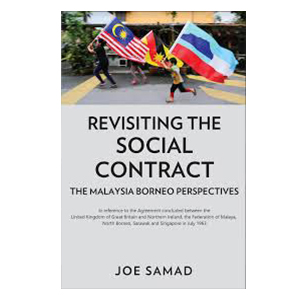Revisiting the Social Contract: The Malaysia-Borneo Perspectives
Joe Samad, a passionate writer on contemporary Malaysian issues, expresses deep concerns about Malaysia’s direction. While acknowledging the existence of the pre-Merdeka “social contract”, he highlights two significant reservations. Firstly, he criticises how Peninsula politicians intermittently exploit the social contract to stoke communal fears, hatred, and distrust among races. Secondly, he emphasises that the pre-Merdeka social contract holds less relevance for the Borneo States. These states, upon agreeing to form Malaysia in 1963, negotiated terms emphasising autonomy, revenue sharing, and protection for Borneo’s indigenous peoples. This “Borneo perspective,” often overlooked, offers insights spanning historical, political, and economic dimensions.
Although not explicitly stated, Joe Samad implies that a new “social contract” might have been effectively renegotiated in 1963 between the Peninsula and the Borneo States. Amendments to the Federal Constitution significantly accommodated the states’ demands for greater autonomy and revenue sharing. However, the outcomes have not met expectations, with inherent tensions typical in federal systems worldwide, including Malaysia. Since 2018, there has been a positive shift as the federal government acknowledged the constitutional validity and reasonableness of many demands from Sabah and Sarawak, signaling potential policy changes. The author recognises these dynamics and advocates for a dialogue to navigate Malaysia’s multicultural complexities and the challenge of forging a cohesive national narrative for better unity.
RM32.00
Out of stock
Description
Joe Samad, a passionate writer on contemporary Malaysian issues, expresses deep concerns about Malaysia’s direction. While acknowledging the existence of the pre-Merdeka “social contract”, he highlights two significant reservations. Firstly, he criticises how Peninsula politicians intermittently exploit the social contract to stoke communal fears, hatred, and distrust among races. Secondly, he emphasises that the pre-Merdeka social contract holds less relevance for the Borneo States. These states, upon agreeing to form Malaysia in 1963, negotiated terms emphasising autonomy, revenue sharing, and protection for Borneo’s indigenous peoples. This “Borneo perspective,” often overlooked, offers insights spanning historical, political, and economic dimensions.
Although not explicitly stated, Joe Samad implies that a new “social contract” might have been effectively renegotiated in 1963 between the Peninsula and the Borneo States. Amendments to the Federal Constitution significantly accommodated the states’ demands for greater autonomy and revenue sharing. However, the outcomes have not met expectations, with inherent tensions typical in federal systems worldwide, including Malaysia. Since 2018, there has been a positive shift as the federal government acknowledged the constitutional validity and reasonableness of many demands from Sabah and Sarawak, signaling potential policy changes. The author recognises these dynamics and advocates for a dialogue to navigate Malaysia’s multicultural complexities and the challenge of forging a cohesive national narrative for better unity.
Publisher: SIRD
2024
Paperback
ISBN:9786297575285

 In the Country of Men
In the Country of Men
 In the City by the Sea
In the City by the Sea
 Gold from the Stone: New and Selected Poems
Gold from the Stone: New and Selected Poems
 Girls Are Coming Out of the Woods
Girls Are Coming Out of the Woods





